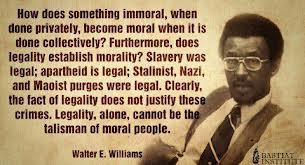

Historical costs, sometimes called sunk costs, are irrelevant to decision-making because they are costs that have already been incurred. That's something that's not intuitively obvious, even for some trained economists. On a couple of occasions, I've recommended to a graduate student, having difficulty with his Ph.D. dissertation, that it might be wise to start all over again with a different topic. The response:
"Professor Williams, but I've spent so much time on the dissertation so far." I reminded the student that the time already spent should have nothing to do with his decision to either stick with his chosen topic or choose another one. His question should be: Which choice, sticking with the chosen topic or choosing another, will more readily lead to successful completion of his doctorate?
When Hurricane Katrina struck the Gulf Coast, gasoline prices started rising immediately. Some people couldn't understand why prices rose for gasoline already in the pipeline long before Katrina struck. The fact that prices for gasoline produced before the disaster rose led to charges of price gouging. Many people believed that historical costs, what a retailer paid for it, should determine price.
That's patently wrong, and a simple example will demonstrate it. Say you've been selling me coffee from your large inventory for $4 a pound. A crop disaster in Brazil spikes the world coffee price to $10 a pound. What will you charge me now? If you said at least $10, go to the head of the class. Why? Because the opportunity cost, or replacement cost, of coffee is now $10. What coffee cost before the disaster is irrelevant.
You say, "Williams, I'm not greedy. I'd sell it to you for $4 until I ran out." That's great. I'd buy it from you for $4 and resell it for the world price of $10.
At the time of Katrina, gasoline retailers couldn't replace their gasoline at yesterday's prices. In other words, gasoline prices, coffee prices and any other price reflect conditions in the market today, not yesterday.
Today's debate over the Iraq War is so often discussed in terms of whether it should have been initiated in the first place, our faulty intelligence about Hussein's possession of weapons of mass destruction, and whether the Bush administration lied to the American people. Whether these observations and charges are true or false should in no way be a part of today's decision-making, for history is one of those immutable facts of life. We can change the future, but we cannot change the past, though we can learn from it.
The only costs relevant to decision-making are what economists call marginal or incremental cost; that's the change in costs as a result of doing something. That cost should be compared to the expected benefit. Think about pollution. Getting rid of pollution is a no-brainer. All that the authorities of, say, Los Angeles would have to do is to mandate that all pollution-emitting sources shut down. That would mean no driving, no manufacturing, no airplanes, no power generation and no lawn mowing. Angelenos would have perfectly clean air, but I doubt whether they'd agree that it's worth the costs. That means perfectly clean air is non-optimal, and so is perfectly dirty air. The question is, how much clean air do we want and at what cost? In other words, we should compare the additional benefit of cleaner air to the additional costs of getting it.
The idea of weighing the costs of doing something against its benefits are part and parcel of intelligent decision-making. If we only look to benefits, we'll do darn near anything because everything has some kind of benefit.
Walter E. Williams is a professor of economics at George Mason University. To find out more about Walter E. Williams and read features by other Creators Syndicate writers and cartoonists, visit the Creators Syndicate Web page at www.creators.com.